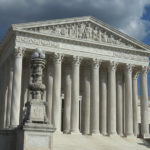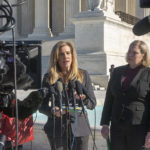WASHINGTON—The U.S. Supreme Court issued a landmark decision June 15 when it ruled nondiscrimination protections in federal workplace law make employment discrimination against LGBTQ individuals illegal.
In a 6-3 decision, the Supreme Court ruled Title VII of the 1964 Civil Rights Act—which prohibits employment discrimination based on sex, as well as on race, color, religion or national origin—extends to sexual orientation and gender identity.
“In Title VII, Congress adopted broad language making it illegal for an employer to rely on an employee’s sex when deciding to fire that employee. We do not hesitate to recognize today a necessary consequence of that legislative choice: An employer who fires an individual for being gay or transgender defies the law,” Justice Neil Gorsuch wrote in the court’s majority opinion on Bostock v. Clayton County, Ga.
With regard to religious liberty issues and whether Title VII protections for LGBTQ employees might conflict with some employers’ religious convictions, Gorsuch wrote, “We are also deeply concerned with preserving the promise of the free exercise of religion enshrined in our Constitution; that guarantee lies at the heart of our pluralistic society.”
The court pointed to protections offered by the First Amendment, statutory exemptions for religious organizations and the Religious Freedom Restoration Act of 1993.
“Because RFRA operates as a kind of super statute, displacing the normal operation of other federal laws, it might supersede Title VII’s commands in appropriate cases,” Gorsuch wrote. “But how these doctrines protecting religious liberty interact with Title VII are questions for future cases.”
Gorsuch—who was appointed to the court by President Trump—was joined in the decision by Chief Justice John Roberts, along with Justices Elena Kagan, Sonia Sotomayor and Ruth Bader Ginsberg.
Justice Samuel Alito wrote a lengthy dissent, joined by Justice Clarence Thomas, in which he asserted the decision “will threaten freedom of religion, freedom of speech, and personal privacy and safety.” Justice Brett Kavanaugh filed a separate dissenting opinion.
Varied reaction to ruling
Russell Moore, president of the Southern Baptist Convention’s Ethics & Religious Liberty Commission, predicted the court’s ruling—and the manner in which the majority interpreted an existing statute—could have far-reaching results.
Sign up for our weekly edition and get all our headlines in your inbox on Thursdays
“The precedents set here will have major implications going forward on how the public meaning of words at the time laws are passed should mean for how they are interpreted in the future,” Moore wrote. “This will mean that legislators actually won’t know what they are voting to pass—because words might change cultural meaning dramatically between the time of passage and some future court cases.
“The ruling also will have seismic implications for religious liberty, setting off potentially years of lawsuits and court struggles, about what this means, for example, for religious organizations with religious convictions about the meaning of sex and sexuality. This will mean not only that this is just the beginning of the legal discussion at this point, but also that Congress must clarify precisely what they intended, or intend now, in laws that protect women from unjust discrimination—laws that now are to be applied much more broadly.”
In contrast, Rachel Laser, president and chief executive office of Americans United for Separation of Church and State, praised the decision as a “major step forward in living up to our Constitution’s promise of freedom and equality for all.”
She warned the threat to freedom will come not from the court’s decision but from future challenges when “people will try to undermine this win with false claims of religious freedom.”
“The progressive, inclusive faith and secular communities must come together to make clear that religious freedom is a shield that protects, not a sword that licenses discrimination and harm to others,” Laser wrote.
Kelly Shackelford, president and chief counsel at the conservative First Liberty Institute, took a wait-and-see approach in his response to the court decision, saying: “We are grateful that the Supreme Court was clear in the opinion that this federal statute does not overrule people’s religious freedoms. We will find out in the very near future whether this is a hollow promise or a truthful assurance that the religious liberty of all Americans will be protected.”
Does Title VII apply to churches? When?
John Litzler, a Texas Baptist attorney who works exclusively with churches and Christian nonprofit organizations, noted Title VII makes it clear its provisions do not infringe on the rights of religious organizations to make employment decisions based on the religious beliefs of its employees.
“This means churches aren’t violating Title VII when they make an adverse employment decision against an individual based on his or her religious beliefs differing from the church’s beliefs. And churches can discriminate based on religion for any position, even if the job is purely 100 percent secular duties,” said Litzler, who is director of the Church Law Division of Christian Unity Ministries in San Antonio and serves as a legal consultant with the Baptist General Convention of Texas.
However, decisions based on other criteria—race, disability, sex and now sexual orientation and gender identity—are another matter.
Who is a minister?
Statutory law recognizes what is sometimes called the “ministerial exception” or “ecclesiastical exception” that bars the application of anti-discrimination laws to religious institutions when it comes to employing ministers.
“Courts across the country had been applying some sort of religious exception for religious organizations that discriminated when hiring, but it wasn’t until 2012, when the Supreme Court decided unanimously in a 9-0 decision in the Hosana-Tabor Evangelical Lutheran Church and School case, that there was a nationally recognized ministerial exception,” Litzler said.
While the Supreme Court did not provide a clear-cut definition for who qualifies as a minister, he explained, it offered four factors to consider: the formal title given by the religious group; the substance reflected by that title; the employee’s own use of the title; and the important religious functions the employee performs for the church.
“In a concurring opinion, two justices said the fourth factor—the importance of the religious functions—should be the key to the analysis, and most circuit courts are doing that,” Litzler said.
He pointed to several examples:
- The 6th Circuit Court applied it to an InterVaristy collegiate employee when she sued because the ministry fired her after she got divorced.
- The 7th Circuit Court applied it to a teacher at a Jewish day school teacher when she sued claiming the school fired her because of a medical impairment in violation of the Americans with Disabilities Act.
- The 2nd Circuit Court applied it when a chaplain fired from New York Methodist Hospital claimed it was illegal racial and religious discrimination.
A music minister by any other name …
The most pertinent case for congregations might be a 5th Circuit Court opinion in which a music director was fired by his church in Austin.
“The music director pointed out that he didn’t have any formal religious training or education, didn’t have the title of ‘minister,’ and performed lots of secular functions like keeping the books and operating the sound system. But the 5th Circuit said that because the music director organized the music and also accompanied the choir by playing piano, he fell under the definition of ‘minister,’” Litzler said. “The court held that church musicians ‘exercise a genuine liturgical ministry.’”
So, he noted, church musicians in Texas fall under the ministerial exception.
“In each of these cases, the circuit court dismissed the claim of the former employee against the hospital, school, church or campus ministry by saying that the employer was exempt from discrimination claims under the ministerial exception,” Litzler said.
Waiting for a clarifying ruling
However, he added, not every circuit court has interpreted the law the same way.
Recently, the 9th Circuit Court in the West and Pacific Northwest ruled in two cases that private school teachers could move forward on their claims of age discrimination and disability discrimination.
“The 9th Circuit ruled the ministerial exception didn’t apply, even though the teachers taught some Catholic religious beliefs using a Catholic workbook for about 30 minutes a day four days a week,” Litzler said.
The U.S. Supreme Court heard appeals in the matter—remotely, due to COVID-19 restrictions—last month.
“Their ruling in this case will be critical in clarifying and setting the limits of the ministerial exception and providing uniform guidance for all of these circuit courts dealing with these ministerial exception cases,” Litzler said.














We seek to connect God’s story and God’s people around the world. To learn more about God’s story, click here.
Send comments and feedback to Eric Black, our editor. For comments to be published, please specify “letter to the editor.” Maximum length for publication is 300 words.